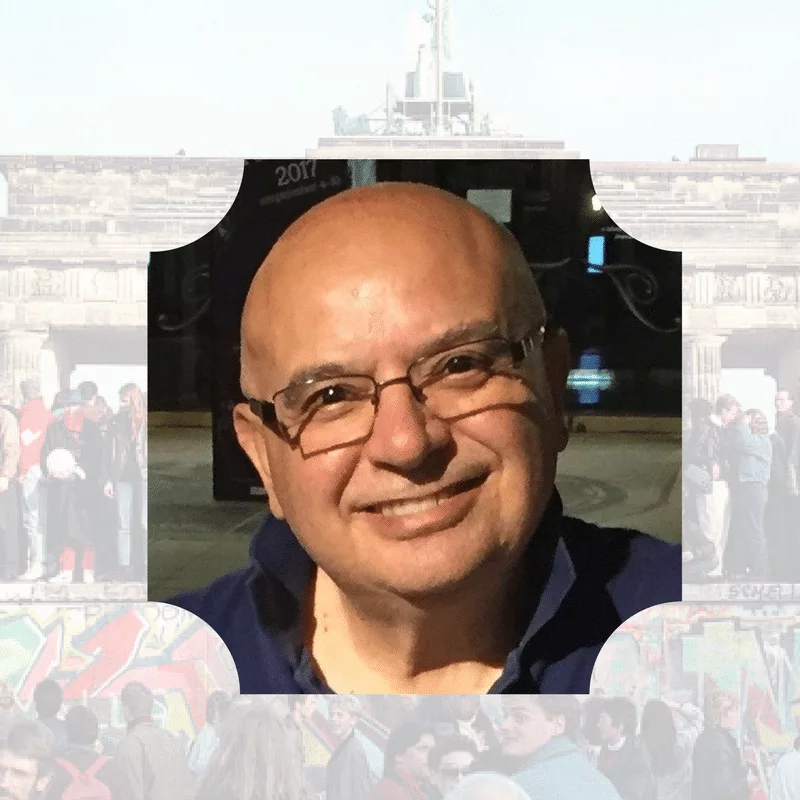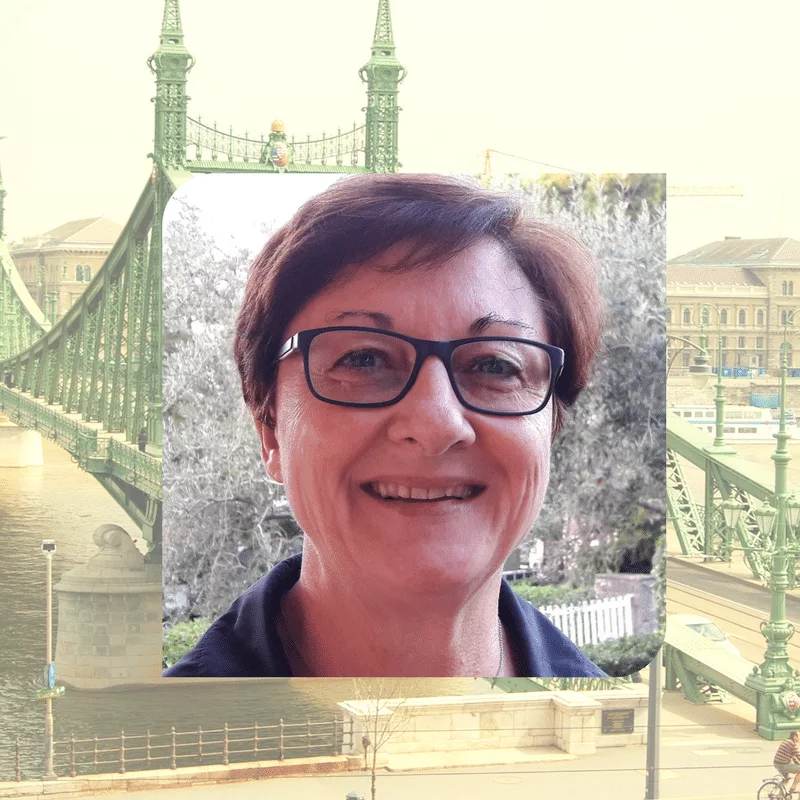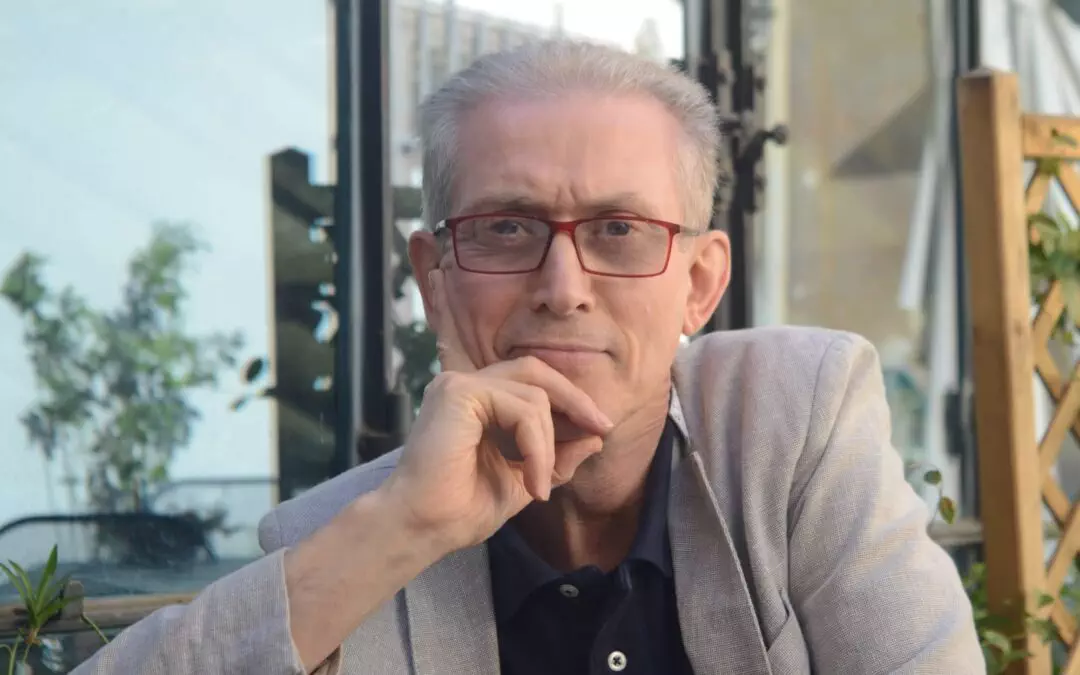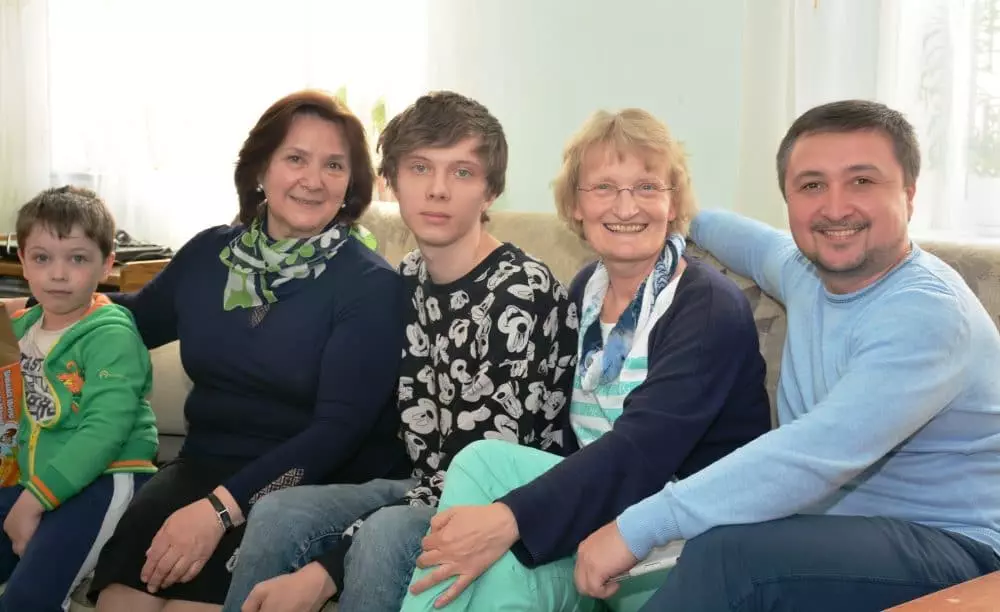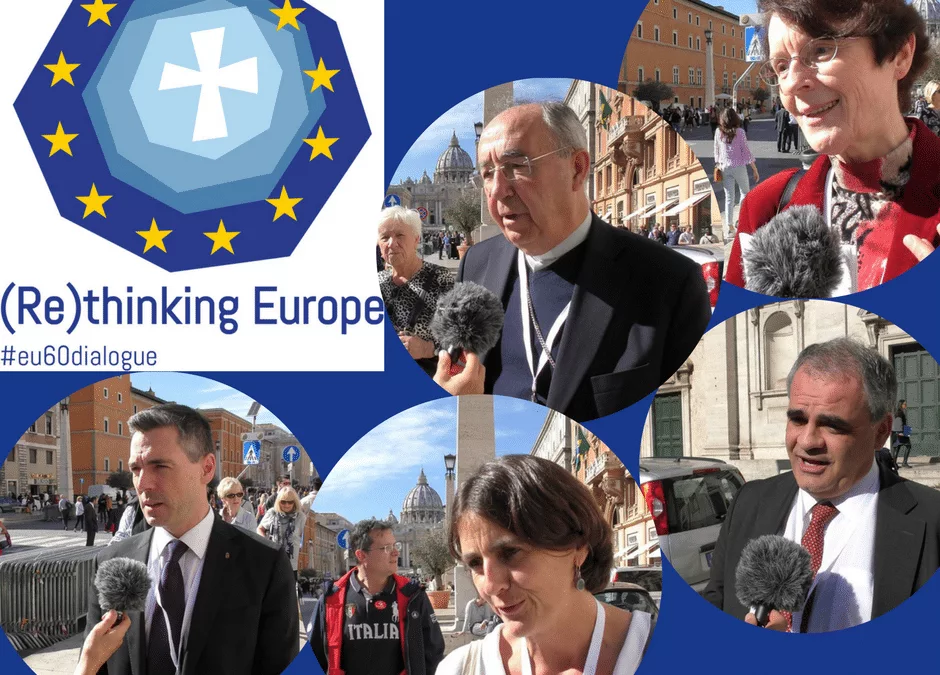
by TogetherforEurope | Oct 31, 2017 | Experiences, reflections and interviews, News
A meeting at the Vatican to rethink about Europe. Together for Europe was there.
«In our time, Christians are called to revitalize Europe and to revive its conscience, not by occupying spaces, but by generating processes capable of awakening new energies in society”. Pope Francis said these words at the end of his address to the 350 participants, present at the Vatican for a meeting sponsored by the Commission of the Bishops’ Conferences of the European Community (Comece) in collaboration with the Secretary of State. The title was “(Re) thinking Europe – a Christian contribution to the Future of the European Project” (27 -29 October 2017). This conference was meant to create an opportunity where one could discuss the contribution Christians can give to the European project, with the hope that dialogue put into practice can be of help to Europe and its institutions at this very critical stage.
During meetings held in previous days, Cardinal Marx, Archbishop of Munich and Freising and President of Comece, gave a picture of the continent’s realities, perspectives, challenges and hopes. He spoke of issues, such as environment, work, refugee crisis, that have to be faced “with a very clear vision of our present, and above all of the future”
Msgr Jorge Ortiga, Archbishop of Braga and delegate for the Portugese Bishops’ Conference said, “the European Union needs a soul, it needs something new. This is not the case of just considering the territory or the economy; but it is the responsibility of building one society, one body that expresses diversity, respect for every culture, every country with its different characteristics”
András Fejerdy, professor at the Catholic University of Budapest said: “Even if the Berlin Wall fell 25 years ago, divisions in our minds still exist. Maybe, we who live in the eastern part of Europe know the history, culture and thought of the Westerners better. On the other hand, we face many misunderstandings because of lack of knowledge. I participated in a workshop with representatives from the East and South of Europe, and it was interesting to see that we all share the same hopes and fears about the future of Europe”.
Katrien Verhegge, director general of Kind en Gezin, in Belgium, said: «It is in this context that we promote our message of unity and diversity. For me this means going back to what is essential: love and the golden rule. We can unite ourselves in living the golden rule, “in not doing unto others what we would not have others do unto us”. If we start to live this in our rethinking about Europe, we will already be making a step foward”.
For Pedro Vaz Patto, president of the Portugese Peace and Justice Commission, this is actually a moment “of crisis of confidence in Europe. As Christians, we have tried to contribute towards a Europe in search of a soul. The EU motto is “unity in diversity”. We Christians believe in God, who is one and who is Trinity. So our faith helps to live this unity in diversity, first of all through our witness. Among Christian Movements, Churches, individuals”.
Ilona Toth, Focolare Movement’s delegate for Togther for Europe was among the participants. Together for Europe brings together more than 300 Christian Communities and Movements spread across the Continent. While preserving their independence, these collectively form a network to pursue shared goals, each contributing through its own specific charism. Toth said that: ”The Together for Europe Project is very much in line with what was discussed during this conference and many showed interest in it. We have been invited to Brussels to start work of collaboration, while envisaging the importance of empowering Europe’s peoples to build their history”.
-
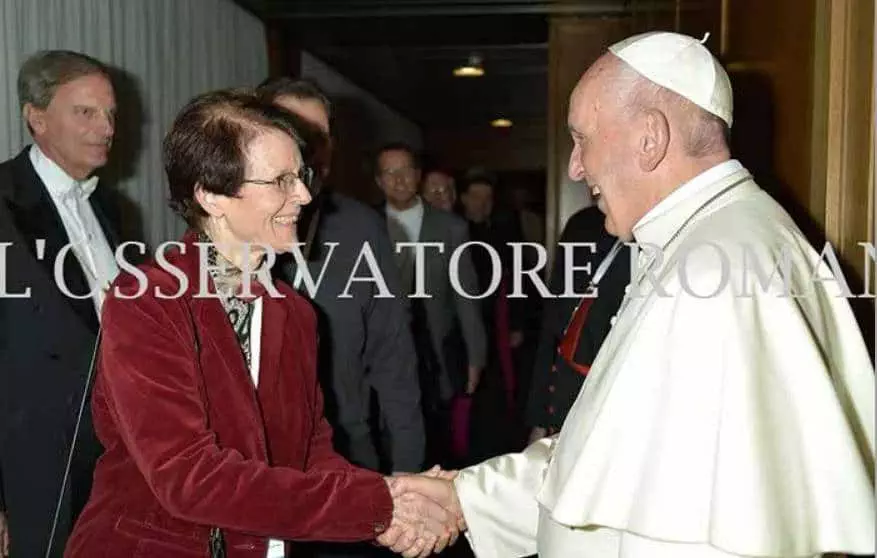
-
Ilona Toth representative of TfE
-
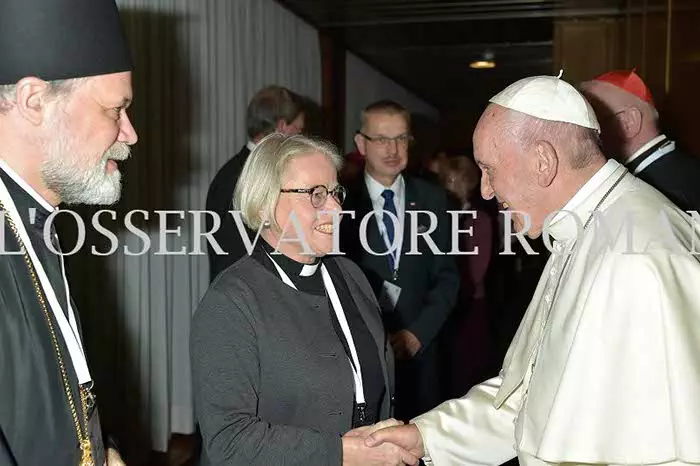
-
Rev. Karin Burstrand, Vice-President of the CEC
-

-
left: Rev. Fr Heikki Huttunen, General Secretary of the CEC
-

-
Bishop Heinrich Bedford-Strohm, President of the Evangelical Church in Germany
Significant the presence of leaders of different Churches, including Lutheran Bishop Heinrich Bedford-Strohm, Chair of the Council of the Evangelical Church in Germany (EKD) and representatives of the Conference of European Churches (CEC): General Secretary Rev. Fr Heikki Huttunen and Vice-President Rev. Karin Burstrand.
At the end of his address, Pope Francis said that the commitment of Christians in Europe “must represent a promise of peace” and that “it is not the time to dig trenches, but to work courageously to realize the founding father’s dream of a united and harmonious Europe, a community of peoples who wish to share a future of development and peace”.
Source: SIF
Address of Pope Francis >
Video: https://vimeo.com/240377109

by TogetherforEurope | Oct 26, 2017 | Experiences, reflections and interviews, News
‘Behind the iron curtain’ was a metaphorical attribution given to those countries that from the end of the Second World War until 1989 were part of the communist bloc. The ‘iron’ curtain in question represented the ideological split which divided Europe in two halves, an ideological split physically represented by the Berlin Wall.
When for research purposes I visited Prague, in former Czechoslovakia, the memory of Jan Palach was very much alive with many university students considering him a hero: on 16th January 1969 Jan Palach set himself on fire to draw the attention of the world to the exasperation in which his nation lived. My impression was that in the capital city of Czechoslovakia two parallel worlds coexisted: one official and visible, and another hidden but ever so present.
I had a similar experience living in Hungary in the 1980s. At that time, only a censored and sanitized version of news from Eastern European countries reached the West… Not much was known about Hungary outside the events of 1956. Initially I travelled to Budapest on a research scholarship into children’s literature, but my stay developed into a chain of surprising events and considering the political and historical context – small miracles.
Thanks to the translations I became known for, I received an award which allowed me to remain in Hungary as a lecturer at the Janus Pannonius University of Pecs. In a context of politics manipulated by interests and ideology, the ability to incorporate any kind of positive message into teaching required a sense of personal responsibility and freedom.
On one of my train journeys, while waiting at one of the endless border custom checks, I spotted a bird jumping on the barbed wire fence dividing the two countries. This sight prompted me to ponder how long those barriers would remain and I drew some hope from Giambattista Vico, a philosopher from Naples, Italy, who spoke about the fact that things which are outside their natural order do not remain so.[1]
In 1989, immediately after the fall of the Berlin Wall I happened to conduct a sociological study on the change of toponyms of the streets and squares of Budapest and on destiny of statues left in that country by communist realism. These were eventually to be transferred to a specially designated garden which served as a sort of a ‘historical ZOO’ where parents would bring their children on Sundays… Some of the Soviet red star sculptures would have to wait for years to be taken down owing of their sheer size and weight.
After 16 years in Hungary, and after visiting other former Warsaw pact countries such as Slovakia or Poland, and places such as Auschwitz I understood better the reason of my being and I have become more and more grateful to God for the possibility to help make Europe and the entire world a family.
I also feel how right Victor Hugo was in in his famous [mis]quote : “Nothing is more powerful than an idea whose time has come”.[2]
by Tanino Minuta
[1] Giambattista Vico, Opere Vol. I, Tipografia della Sibilla, Naples, 1834, p. 12. [free translation]
[2] http://nuovoeutile.it/222-frammenti-sulla-creativita-a-cura-di-annamaria-testa/ [http://www.quotecounterquote.com/2011/02/nothing-is-more-powerful-than-idea.html]

by TogetherforEurope | Oct 14, 2017 | Experiences, reflections and interviews, News
9 November 1989: an unforgettable date in recent history marking the fall of the Berlin Wall. In the evening of that same day I was too transfixed in my chair in front of the TV to notice an unexpected event the import of which my own young generation at the time could not possibly grasp.
I had studied (and held a degree in) modern history. I studied all about the Cold War and the building of the Berlin Wall, which in those November days was being reversed to rubble. A few months later we were to learn from the press the stories of the peoples of Czechoslovakia, Hungary, Poland and Romania who, by means of more or less peaceful revolutions, were freeing themselves from seven decades of Soviet burden.
I could never have dreamt on that November day, that the stories and images from the media would have become incarnated for me, in real people whom I was about to meet, as only a short month later I descended in Keleti Railway Station in Budapest, brought by train from Rome crossing Slovenia and Croatia. I was offered the post of Italian language and history teacher in a secondary school in the Hungarian capital. A small group of people with big smiles and a bunch of flowers welcomed me in the smoky atmosphere of the station. This was my first encounter with a country in Eastern Europe: the cordial encounter with these normal people who soon became a family to me, in distinct contrast to the atmosphere of sadness and distrust that still prevailed, with unambiguous signs of ‘control’ (groups of Soviet soldiers discharged onto footpaths by imposing military trucks). This despite the fact that a Hungarian Republic had been proclaimed in October 1989. It would take more than two years for the last soldier donning the red Soviet star to leave the country for good.
The first months of ‘freedom’ were a transition phase both politically and socially: whilst the democratic government was making its first steps and had to cope with many unknowns (and strikes!), a variety of products, some from abroad slowly filtered into the shops. Daily life was still complicated, at least for me, coming from the West. I was used to a certain style of cooking, but it was impossible to find the same ingredients on the market. One day in 1990, the taxi and the public transport drivers blocked all bridges over the Danube in protest against the increase in the price of petrol. In a flash there were endless queues outside shops selling bread and soon all shops were empty. «it’s like in ‘56» – people would say, meaning: there was nothing left to eat. People were unable to reconcile these conditions with a belief that the worst had already passed never to return.
Only when I began to teach did I fully appreciate the different social history in which I was now living, where all historical references were seen from the perspective of Moscow and revolved around the concept of class struggle. I found myself having to explain to my ingenuous students, things which until then I had taken for granted. Among the most obvious was an episode just prior to Christmas in 1990. In order to practice Italian conversation, we spoke about Italian Christmas traditions. I described enthusiastically images of the Nativity and the crib present in those days in every Italian family. After I spoke for about half an hour, a girl with dark hair put up her hand at the back of the class and asked: «Professor, but who is this Jesus?».
by Maria Bruna Romito
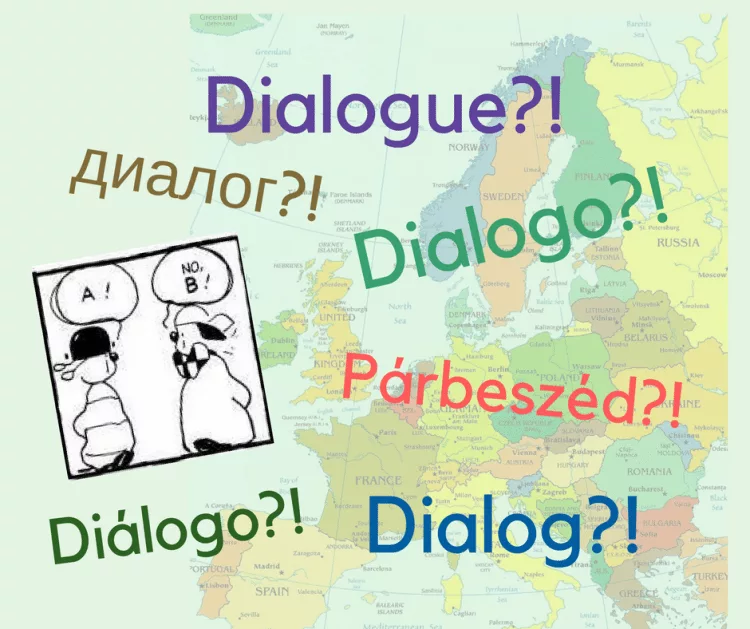
by TogetherforEurope | Sep 30, 2017 | 2017 Friends | Vienna, Austria, Experiences, reflections and interviews, News
Dialogue, Párbeszéd, Dialog, диалог, Dialogo, Dialóg…
A word fundamental to today’s Europe. How can we deepen our understanding of this word? We feel the need for Eastern and Western European countries to continue, or rather, to begin again getting to know each other. This is the premise for the upcoming meeting of Friends of Together for Europe in Vienna (9th -11th November 2017) which will be a ‘workshop’ on this topic.
-
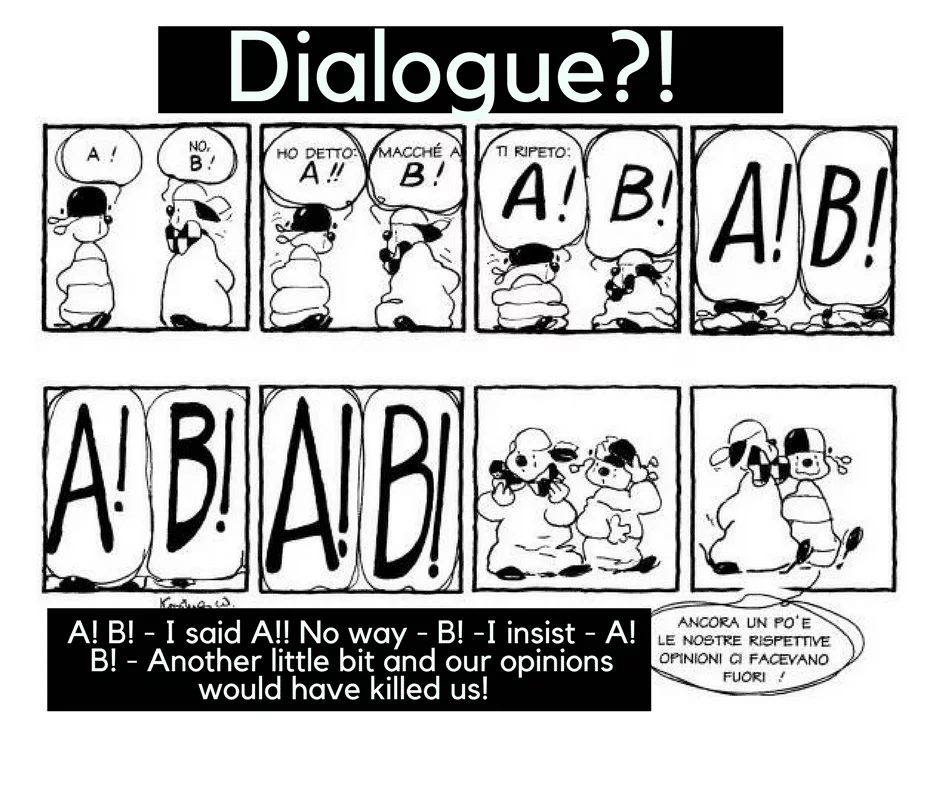
-
click to enlarge the cartoon
We have been looking for speakers on this extremely pertinent theme. Many of you no doubt would have something of value to contribute. To date we have considered including experiences from the following people:
Gennaro Lamagna A view of the Balkans by a man from Naples>
Beatriz Lauenroth Further and further East>
Tanino Minuta (to be published online in October)
Maria Bruna Romito (to be published online in October)

by TogetherforEurope | Sep 29, 2017 | Experiences, reflections and interviews, News
It is not easy to sum up more than ten years in Slovenia, Croatia and Romania.
I can say that I felt immediately at ease. My early times in Slovenia were demanding, because it was so completely different to where I had come from. I did not speak the language; the weather was very cold with the typical smell of coal burning in stoves inside seemingly every house. One of my first enduring impressions was the sense of order and discipline. I can recall going to buy fruit with one of my friends from the community. While he joined the queue outside the shop, I stood slightly to the side. Then I noticed that there was another queue forming behind me… I soon realised that the same was happening at bus stops too. I was very impressed by it.
After 5 years in Slovenia I then moved to Croatia which accompanied an immediate sense of freedom: I was starting to study the language at university, I was meeting many people, exploring and discovering the city I was living in and doing many interesting things which I could not do before. I found the Croats similar to my own people: warm, welcoming and appreciators of good food.
Fall of the Wall
This was an unforgettable experience lived with my friends moment by moment, aware that what we were seeing on the TV was the world in the process of changing!
The war
The war in the Balkans was one of my strongest experiences of that period. It was a strange one in that Zagabria, where I lived at the time, was not involved in the conflict directly. The first few days, however, were terrifying because of the presence of snipers shooting randomly at civilians. My strongest memory however is not so much of destruction but of solidarity among people. It was very moving to witness the arrival of humanitarian aid in the form of food and clothes. Around that time my parents both passed away in Naples. I went back to Italy, emptied my family home in Naples and brought everything back with me to Croatia to help those in need.
I recall how in 1993, still in the midst of war, we managed to organise a youth festival for approximately 3.000 young Catholic and Orthodox Christians, as well as Muslims from former Yugoslavia, Romania, Bulgaria and Moldova. One of the most emotional moments was a chant by a Muslim choir! The event was broadcasted by TV and radio and was on the front pages of all newspapers in the capital.
Dacia (Romania)
My experience in this country was one of coming from a life of prosperity and wellbeing to a situation of relative poverty. There was a sense in which the communist regime had managed to destroy all cultural, civic and folk tradition of that country. I was shocked! I recall a youngster whom I knew from having seen him around and who asked me for money. At the time, I could not help him because I did not have the amount he required. The episode made me think a lot: why did he asked me of all people? Because he knew I was Italian and thought I can return at any point where I came from. Real poverty is a feeling of not having anything and no one “able to help”.
As in Zagabria, also in Romania I experienced a deep communion among brothers and sisters who were looking for something that would finally give meaning to their life: Love! And with many of them, just like with those in Slovenia and Croatia to this day I have strong brotherly relationships.
by Gennaro Lamagna

by TogetherforEurope | Sep 28, 2017 | Experiences, reflections and interviews, News
Rossiya mon Amour
Winter 1991, Moscow. In the early afternoon, my plane touched down in Sheremetyevo Airport.
The arrivals hall was poorly lit, the queue outside the passport controls and visas, long. I had gotten a job at the famous Lomonosov University and with all my possessions was moving to Russia. It was already dark outside and I had the impression that this was the end of the world. Then I heard an announcement: Connections for Novosibirsk and Krasnoyarsk which made me realise that this was where everything started.
Magical beginnings
In Moscow, I lived in a small ecumenical community. Our apartment on Volochaevskaya street was in a working-class quarter, which did not feel particularly safe. When I asked why we didn’t move, like all the foreigners, on the secure embassy grounds, I was told: “Not to worry because where we were, we were protected by the proletariat.”
Contact with our neighbours was indeed spontaneous and easy: elderly women, sitting in the courtyard day and night knew exactly of all the comings and goings; the spontaneity of the children made me forget the awful smell of the dirty staircase. Our new friends – colleagues, students, old and young – all came gladly to Volochaevskaya. They don’t mind that the sofa in our apartment was half eaten by mice and that there was a water leak from a tube in the corridor. The beginnings of our deepening friendship helped us see everything in a different light and forget all the rest.
“Spiritual children” of Alexander Men
In the early 1990s production in Russia decreased rapidly. Shops were empty, everything was scarce. Religious life appeared to be extinct. Within the walls of former churches there were vodka making factories, offices, shops …
We had a long-standing acquaintance with the Russian Orthodox priest Alexander Men. Since the 1960s he had clandestinely baptised thousands of people and had shown a level of ecumenical openness that was dangerous for his time. A lively Orthodox Christian community formed around him. When he was violently killed, he left behind his “spiritual children” as traumatised orphans.
“Where two or three are gathered together in my name” (Mt 18:20)
Soon many people joined us. We lived together the word of the Scripture, for example, ” Where two or three are gathered together in my name, there am I in the midst of them” (Mt 18:20). As they said, they found a new homeland with us. “You don’t proselytise, instead you help us to become yeast for a self-renewal of the Russian Orthodox Church.” After years of spiritual drought, we experienced with them and many others a new Spring. I had never been so happy. The thirst for spiritual life united us despite our cultural differences, diverse upbringing or mentality.
My discovery
In the 1990s – with perestroika and glasnost – many organisations, among them sects, as well as genuine charities from a variety of Churches (Renovabis, Kirche in Not, Bonifatiuswerk, …) and religious Movements (Communion and Liberation, Neocatechumenal Way, Focolare, Community of Sant’Egidio, …) succeeded in entering countries behind the so-called “Iron Curtin”. Some stayed on and some have since left.
What is my personal experience as a citizen of Western Germany after nearly two decades in Russia? I have received much more from this country than I could ever give: among which the gift of deep contemplation which during the Russian Orthodox Liturgy allowed my relationship with God to grow deeper; solid friendships which continue in spite of distance and which reminds me of how much I am loved. In short, I have rediscovered my vocation as a Christian and as a woman: I am called to love.
I believe that during these years we have, in our own way, re-written the Acts of the Apostles. The reality of “having love for one another and having everything in common” (see Acts 4:32) both marked and moulded us. In this light, everything appeared as new: the Gospel goes much further … well beyond Novosibirsk and Krasnoyarsk!
by Beatriz Lauenroth
-

-
Beatriz Lauenroth with russian family






